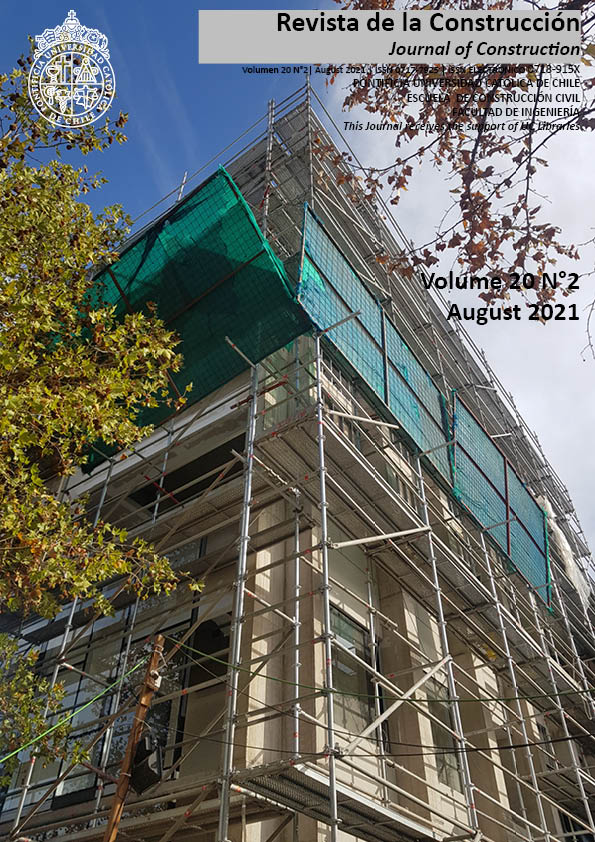Classification and resolution procedure for disputes in public construction projects
DOI:
https://doi.org/10.7764/RDLC.20.2.259Keywords:
construction sector, public investment projects, dispute classification, dispute resolution, FIDIC red bookAbstract
Construction sector, which is associated with approximately two hundred sub-sectors in terms of employment area, plays the role of locomotive sector in economic development of countries. This feature of the sector affects economy directly and indirectly. Despite this positive contribution of the sector, disputes are inevitable between parties –administration and contractor– in a bid, contract and implementation processes, which are parameters of the construction process. Formal judicial process applied for the purpose of resolving disputes encountered in construction projects that the public assumes the role of employer, takes a long time. Therefore, while contractor is exposed to financial losses, administration cannot conclude public investment. In the study; disputes in public construction projects are classified, and proposals preventing disputes are presented. In this scope, firstly, 174 of 10591 disputes submitted to Court of Cassation, and 84 of 102 disputes submitted to Directorate of High Technics Board are selected regarding public construction projects. In the second stage, parameters causing disputes are classified under six main items. Thirdly, reasons of the disputes for each classification are detailed, and then proposals are presented for prevention of the disputes based on FIDIC (International Federation of Consulting Engineers) contract forms. Finally, a resolution procedure is developed for the processes including bid, contract and implementation phases based on FIDIC. By the presented proposals for GCCW (General conditions of construction works) official resolution paths can be reduced to a minimum, and the processes result positively for administration and contractors. It is concluded that the developed procedure is suitable as a practical tool for resolution process of the disputes in the public construction projects.
References
Apanoğlu, E. C. (2007). The analysis of disputes in the construction sector that emerge from the periods and source of uncared debts which are passed onto jurisdiction, MSc. Thesis, Science Institute, Çukurova University (in Turkish).
Aydemir, E. (2016) Work contract and construction law, Seçkin Publishing, Ankara, Turkey (in Turkish).
Aydın, Y. (2010). Dispute resolutions on the FIDIC based investment projects, MSc. thesis, Institute of Social Sciences, Istanbul University (in Turkish).
Balcı, M. (1999). Resolution paths for conflicts, and Arbitration, Danışman publishing, Istanbul, Turkey.
Bilaloğlu, B. (1995). The Conflicts reasons in construction contlacts and analysing of the proposed solutions, MSc. Thesis, Science Institute, Istanbul University (in Turkish).
Bozkurt, M. (2002). Arbitration in construction disputes resolution, MSc. thesis, Science Institute, Istanbul Technical University (in Turkish).
Chan, D. W., & Kumaraswamy, M. M. (1997). A comparative study of causes of time overruns in Hong Kong construction projects, International Journal of Project Management, 7(1), 55-63.
Çakmak, F. P. (2014). Reconstruction of standard contract documents used in the Turkish public construction procurements, PhD thesis, Science Institute, Istanbul Technical University (in Turkish) .
Çevikbaş, M. (2018). An investigation of judicial dispute resolution in Turkish construction industry, MSc. thesis, Science Institute, Yıldız Technical University (in Turkish).
Eken, B. (2005). Disputes in construction contracts, resolution techniques and an upon the disputes resolved by ligitation in Turkey, MSc. thesis, Science Institute, Istanbul Technical University (in Turkish).
Ereli, Y. (2014). Comparative analysis of FIDIC-Red Book and the Turkish public procurement legislation, MSc. Thesis, Science Institute, Bülent Ecevit University (in Turkish).
Fenn, P., & Gameson R. (1992). Construction Conflict Management and Resolution, E & F N Spon London.
FIDIC (2015). Statues and by-laws, International Federation of Consulting Engineers, fidic.org/sites/default/files/ FIDIC%20Statutes_2015_0.pdf [Accessed on January 12, 2019]
FIDIC (2017) Conditions of contract for construction, 2nd edition, FIDIC, Geneva, ISBN: 978-2-88432-084-9.
FIDIC (2019a). About Publications, fidic.org/bookshop/about-publications [Accessed on January 11, 2019].
FIDIC (2019b). Which FIDIC contract should I use?, fidic.org/node/149 [Accessed on January 11, 2019].
Garsonnet, E. (1912). Traite theorique et pratique de procedure civile et commerciale: en justice de paix et devant les conseils de prud'hommes, Recueil Sirey, pp. 384.
Genç, H. (2014). Disputes and dispute resolution recommendations for lump sum turnkey contracts under The Public Procurement Law in Turkey, MSc. thesis, Science Institute, Istanbul Kültür University (in Turkish).
Goodman, A. (2017). Preparing for mediation. Guide for the benefits from mediation, Translation: A. Bıçaksız and Z. Alkın, Republic of Turkey Ministry of Justice, Department of Publishing Affairs, Ankara, Turkey (in Turkish).
Hancock, M. (1992). Educating Construction Professionals to Improve the Built Environment, Construction Conflict Management and Resolution, 25-27 September 1992, London, E & FN SPON, 400-405.
Hellard, R. B. (1992). Construction Conflict-Management and Resolution, Construction Conflict Management and Resolution, 25-27 September 1992, London, E & FN SPON, 34-45.
HTB (2015). Decisions and Opinions, Republic of Turkey Ministry of Environment and Urbanization, Directorate of High Technics Board, Ankara, Turkey (in Turkish).
ICC (2012). Arbitration rules of International Chamber of Commerce, icc.tobb.org.tr/docs/ ICC_Tahkim_Kurallari_Kitapcik.pdf [Accessed on February 2, 2019] (in Turkish).
INTES (2018). Report on construction sector, The Turkish Employers’ Association of Construction Industries, intes.org.tr/wp-content/uploads/2018/11/SEKT%C3%96R-RAPORU.pdf [Accessed on January 15, 2019] (in Turkish).
ISTAC (2017). Arbitration rules of İstanbul Arbitration Center, istac.org.tr/wp-content/uploads/2016/03/ istac_tahkim_kurallari_v3_TR.pdf [Accessed on February 3, 2019].
ISTAC (2018). ISTAC in Numbers, istac.org.tr/wp-content/uploads/2018/05/rakamlarla_istac_tr.pdf [Accessed on February 3, 2019] (in Turkish).
İTOTAM (2017). Arbitration rules of İstanbul Chamber of Commerce, Arbitration and Meditation Center itotam.com/Dosyalar/2018/ITOTAM%20Tahkim%20Kurallari-%202017.pdf [Accessed on February 4, 2019] (in Turkish).
Kerzner, H. (2009) Project Management: A Systems Approach to Planning, Scheduling and Controlling, John Wiley & Sons Inc, New York.
KİK (2017). Annual report for Public Procurement Authority, dosyalar.kik.gov.tr/genel/ IhaleGovTr/KIK_2017_Faaliyet_Raporu_web.pdf [Accessed on February 10, 2019] (in Turkish).
Koldaş, B. (2008). FIDIC dispute procedures, MSc. thesis, Institute of Social Sciences, Gazi University (in Turkish).
Koral, R. (1947). Arbitration in Our New and Old Law, Journal of Faculty of Law, Istanbul University, 193-218 (in Turkish).
KPMG (2018). Sectoral overview, assets.kpmg/content/dam/kpmg/tr/pdf/2018/02/sektorel-bakis-2018.pdf [Accessed on December 14, 2018] (in Turkish).
Langford, D., Kennedy, P., & Sommerville J. (1992). Contingency management of conflict: Analysis of contract interfaces, Construction Conflict Management and Resolution, 25-27 September 1992, London, E & FN SPON, 63-70.
Mersinkaya, S. (2010). Disputes of parties in construction contracts in scope of building construction and proposals for solution, MSc. thesis, Science Institute, Yıldız Technical University (in Turkish).
Murdoch, J. R., & Hughes W. (1992). Building contract law. Longman Law, Tax and Finance.
OCTC (2019). Overseas Contracting Technical Consultancy, Republic of Turkey Ministry of Trade, ticaret.gov.tr/hizmet-ticareti/yurtdisi-muteahhitlik-teknik-musavirlik [Accessed on February 22, 2019] (in Turkish).
Öz, B. (2012). A fuzzy logic resolution model for conflicts encountered in public construction projects, PhD thesis, Science Institute, Istanbul University (in Turkish).
PMI (2013) Project management Knowledge guide, Fifth version, Project Management Institute Turkey (in Turkish).
Smith, M. C. (1992). Facing up to Conflict in Construction, Construction Conflict Management and Resolution, 25-27 September 1992, London, E & FN SPON, 26-33.
TBA (2002). Arbitration directive of Union of Turkish Bar Associations, barobirlik.org.tr/dosyalar/duyurular/tahkim_yonetmeligi.pdf [Accessed on February 21, 2019] (in Turkish).
TMB (2019). Is World reshaping while entering 2019 ? Turkish Contractors Association (TMB) tmb.org.tr/arastirma_yayinlar/tmb_bulten_ocak2019.pdf [Accessed on January 18, 2019] (in Turkish).
Uyanık, N. (2004). Contract management in construction works (Theoretical and Practical Information), Beta publishing, Istanbul.
Watts, V. M., & Scrivener J. C. (1992). Review of Australian Building Disputes Settled by Litigation, Construction Conflict Management and Resolution, 25-27 September 1992, London, E & FN SPON, 210-220.
Zikman, R. V. (1992). Successful conflict management, Construction conflict management and resolution, 25-27 September 1992, London, E & FN SPON, 53-57.





